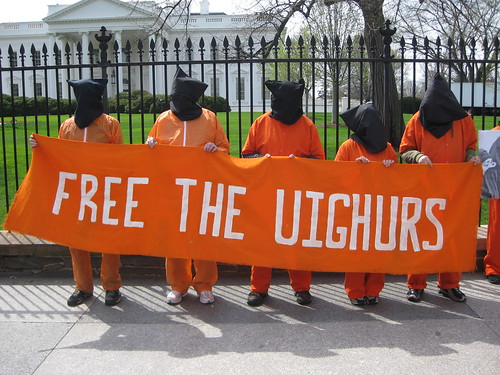 Two days after Cambodia deported 20 ethnic Uighur asylum seekers back to China, the Chinese government issued approximately $1 billion in grants and loans to the Cambodian government. The group of Uighurs had fled China earlier this year in the aftermath of rioting that pitted Uighurs, a Turkic-speaking minority group, against the Chinese government. The group of would-be refugees had applied for asylum in Cambodia through the United Nations, but the Cambodian government deported them before UN authorities could assess their asylum petitions. Yesterday, the UN Special Rapporteur on Torture issued the following statement: “This means that the Cambodian authorities have knowingly prevented an objective determination of their refugee status under the Geneva Convention on refugees and whether the deportees would be at risk of torture, other forms of ill-treatment or the death penalty.” The deportation came one day before China’s vice president, Xi Jinping, arrived in the Cambodian capital, on a trip that many observers suspect may have been the final trigger for the Uighur ouster. China is Cambodia’s largest investor, and has considerable influence within the government.
Two days after Cambodia deported 20 ethnic Uighur asylum seekers back to China, the Chinese government issued approximately $1 billion in grants and loans to the Cambodian government. The group of Uighurs had fled China earlier this year in the aftermath of rioting that pitted Uighurs, a Turkic-speaking minority group, against the Chinese government. The group of would-be refugees had applied for asylum in Cambodia through the United Nations, but the Cambodian government deported them before UN authorities could assess their asylum petitions. Yesterday, the UN Special Rapporteur on Torture issued the following statement: “This means that the Cambodian authorities have knowingly prevented an objective determination of their refugee status under the Geneva Convention on refugees and whether the deportees would be at risk of torture, other forms of ill-treatment or the death penalty.” The deportation came one day before China’s vice president, Xi Jinping, arrived in the Cambodian capital, on a trip that many observers suspect may have been the final trigger for the Uighur ouster. China is Cambodia’s largest investor, and has considerable influence within the government.
This week, the United Nations Security Council redirected its attention to Sudan and the ongoing tensions that continue to fester in the western region of Darfur. On Monday, Secretary General Ban Ki-moon addressed the 15-member council directly, highlighting the potential for further conflict in Sudan in the upcoming months, particularly given the nationwide presidential election to be held in the spring of 2010 and a referendum for southern secession planned for sometime before January 2011. Secretary General Ban referred to the current period as a “critical point” for Sudan, and went onto praise the work of the African Union High-Level Implementation Panel, which recently released a report assessing the crisis in Darfur. Members of the AU panel, which included former South African President Thabo Mbeki, also attended the meeting to brief the Security Council on the recommendations outlined in the report. According to Mbeki, “We were concerned that should the people of Darfur feel excluded in any way from both the elections and consideration of matters relating to the referendum, this would serve to underline their marginalization and disempowerment, which were a central cause of the armed uprising which started in 2003.” A new round of negotiations on Darfur are scheduled to begin next month in Doha, which will include representatives of Sudanese civil society, Darfuri armed rebel movements, and members of the Sudanese government in Khartoum.
On Tuesday, the Supreme Court of Canada handed down two major decisions that relaxed laws regarding libelous speech, marking a major victory for Canada’s newspapers and reporters. In two unanimous rulings, the court sided with those who have argued that the laws governing libel in Canada are too strict to accommodate what the Canadian Association of Journalists defended as “public interest responsible journalism.” According to Chief Justice Beverley McLachlin, “Freewheeling debate on matters of public interest is to be encouraged. While the law must protect reputation, the current level of protection—in efect a regime of strict liability—is not justifiable.” According to many observers, Canada’s libel laws were noticeably harsher than those in the United States and Britain.